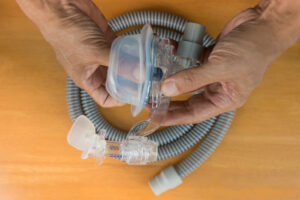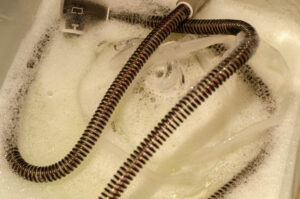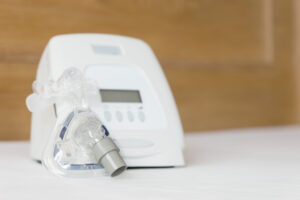Most continuous positive airway pressure (CPAP) machines last approximately five years. The lifespan of a CPAP machine can vary depending on the make and model, how often it is used, and whether it is properly maintained. Some models may only last three or four years, while others have been known to last longer than 10 years.
We’ll examine factors that influence the lifespan of a CPAP machine. We’ll also discuss insurance plans and warranty coverage, how to know when it’s time to replace a CPAP machine, and how to properly dispose of an old device.
What Affects the Lifespan of a CPAP Machine?
How long a CPAP device lasts depends largely on its materials and design. Cleaning and replacing components as needed can help extend its longevity. Though heavy use may shorten the lifespan, it’s important to use the device nightly as prescribed by your doctor.
Most CPAP machines age gradually, but some models experience a sharper drop in functionality around the three- to five-year mark. More rarely, a CPAP device may be recalled by the manufacturer due to a safety or performance issue.
How to Make Your CPAP Machine Last Longer
Regularly cleaning your CPAP machine, replacing parts as needed, and familiarizing yourself with the warranty terms can help reduce the chances of premature damage.
| Clean on a Schedule | Cleaning your CPAP machine’s components helps keep out allergens and bacteria and prevents unnecessary strain on the device from dust and dirt. Check your user manual for instructions on how to clean your CPAP machine. Different components may need to be cleaned on a daily or weekly basis. Most manufacturers recommend using warm water and mild soap to clean CPAP masks, tubing, and humidifier water chambers. Avoid using ultraviolet light and ozone cleaners, as the Food and Drug Administration has issued a warning about their safety and efficacy. |
| Perform Regular Maintenance | To keep the machine working properly, replace the filter, mask components, tubing, headgear, and the humidifier water chamber on a regular basis according to the manufacturer’s instructions. |
| Know Your Warranty | Most CPAP warranties cover material and workmanship defects during the first two years after purchase. Read the warranty terms and follow the cleaning, usage, and maintenance instructions to remain eligible for coverage. If an issue comes up, submit a claim as soon as possible. |
Will Health Insurance, Medicaid, or Medicare Replace an Old CPAP Machine?
Medicare covers repair or replacement of CPAP machines that have reached the end of their reasonable lifespan, usually considered to be five years. There’s no need to undergo another sleep study, but your doctor must confirm that you still need and use the CPAP machine.
Coverage under state Medicaid programs or private health insurance plans may vary.
Can You Use an FSA or HSA to Replace Your CPAP Machine?
Flexible spending accounts and health savings accounts are designed to help cover medical expenses and should be eligible for use toward replacing a CPAP machine. Before allocating funds to replace a CPAP device, confirm eligibility with your FSA or HSA plan provider.
Frequently Asked Questions About the Lifespan of a CPAP Machine
Failing CPAP machines may overheat, show error messages, be noisier than usual, develop structural damage, or have trouble delivering the right amount of pressure. The buttons and dials may become faulty, or the machine may refuse to turn on at all. A device may also need to be replaced if the CPAP machine user or a sleep partner notices that sleep apnea symptoms have returned.
Before replacing your device, check to see if the problems are coming from a replaceable component, such as the tubing. You may also ask your doctor to confirm that the machine is calibrated correctly and that the mask fits well.
If your old CPAP machine has been well maintained and is still in good working condition, then it may be acceptable to use as a backup. You should not use a machine with broken parts or a device that is not properly calibrated, as these do not provide effective treatment for sleep apnea.
CPAP machines are designed to work well until they are ready for replacement. There may be a slight dip in performance over time, but when they become noticeably less effective, you should replace faulty parts or get a new machine.
Certain charitable organizations and medical equipment companies accept donations of used CPAP machines, providing they meet certain criteria. You may also be able to sell to an authorized reseller or dispose of a used CPAP machine at local recycling facilities.
Ask the Sleep Doctor
Have questions about sleep? Submit them here! We use your questions to help us decide topics for articles, videos, and newsletters. We try to answer as many questions as possible. You can also send us an email. Please note, we cannot provide specific medical advice, and always recommend you contact your doctor for any medical matters.






